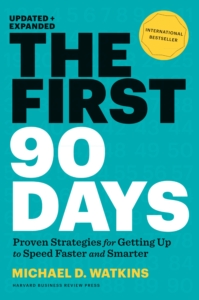New job? How to make a positive impact and do it FAST!

Photo by Danielle MacInnes
You’ve landed a new role. Big congratulations! But beware… it can be a surprisingly tricky transition, a complex pivotal time unless you’re prepared. A career move can make or break a leader, especially a new leader with little experience. You need a good, solid plan of action. Here’s our survival kit.
Your first action in your new role
What’s the first thing you do when faced with uncertainty, with an unknown situation? You make a plan, of course, just like you would in any other work-led situation you’re not sure about. And that means going in with a strong, positive growth mindset, getting genuinely interested, and honing those investigative skills.
Why? Because you can’t move fluidly through your new context until you fully understand it, from top to bottom and inside out. Deep knowledge is an excellent starting point. Be ready to learn about your new context as fast as you can, including the people, the politics, the commercial mores, the goals, the markets, the problems, the audiences… everything.
You also need to know exactly what you stand for as a leader, know your own values, and understand and articulate your own unique purpose. You’ll need to manage people’s expectations and really get to know your team. After all, without them on board – or with too much resistance from them – your initial impact will be considerably weakened.
There’s more. It’s important to know which key people you need to get close to. It’s essential to get your story straight in your own mind and ensure all the conversations you’re having are with the people who count, something called conversational dexterity.
Get organised – Harness the 90 days approach
So how do you do all this, think about all this, achieve it in a timely fashion, in the right order, and make the best job of it? You need to take the 90 Days approach, which is both simple and extremely effective.
A great book that will help you get started quickly is:

Michael Watkin’s advice is tried and tested. His suggestions are well established and have been applied across numerous organisational contexts. Many of his principles are described below. His book clearly explains what to do in those crucial first 90 days. If you are new to leadership then this book will be real investment.
The transition into a new leadership role delivers a suite of key challenges. Here’s how to create a plan to achieve real results within your first 90 days.

Photo by Carl J
- Forget the past – You’ve been promoted, so act that way! It means breaking away from your old job and leaving it behind. It’s the past, and it belongs there. You’re in a new situation now, with fresh challenges and opportunities, maybe even a new skill set.
- Learn as fast as you can – Get to grips with the organisation’s history, products, services, market, systems, structures, politics, culture and everything else as soon as possible, including all those vital unwritten rules, the key players, and the technical side of your role.
- Match your strategy neatly to the situation – Diagnose the challenges and opportunities your new role presents quickly and align your approach to solving them with the real-life situation.
- Take hold of a bunch of strong, early wins – Keep an eye open for low-hanging fruit, improvements you can make that dramatically change things for the better. There will almost always be small, quick wins to achieve, and they’ll help build your credibility fast.
- Understand the expectations – Your new boss needs to know, quickly, that you understand their expectations as well as the challenges, opportunities and timelines you’re going to face. Once you ‘get’ their way of communicating and understand their working style it’s easier to figure out what they want and create a plan that delivers it.
- Align yourself properly with the culture – What does the organisation’s architecture look like? Do its systems, structures, strategies, resources, culture and skills align, or are they working against each other? Once you know what they are, you can get rid of sources of conflict and position yourself accurately.
- Build a cracking team – If you’re tasked with team building, you’re in luck. You can identify the perfect people and make sure they get the training they need. If you have an existing team to work with, you need to establish their strengths, weaknesses and preferences early on to make the most of their skills, preferences and inclinations.
- Create a support network – It’s great to have a network of like minds around you, a group of people who have influence over the things you know are important and will potentially support you, help build alliances and win key battles. Just bear in mind it’s unwise to burn any bridges you might need later!
- Build a good work-life balance – You can’t be fully effective if you’re exhausted, run ragged, overworked and stressed. You need to create a healthy work-life balance and make sure your team does the same. It’s also good to have a couple of really good mentors to help you see the wood for the trees, at least in the early days.
- Help everyone move ahead – You matter, but you’re not working in isolation. A motivated, fulfilled team means you’ll be more likely to succeed, and that means nurturing the roles and relationships enjoyed by your team and sharing experiences between you.
Why not watch the video? Here’s IMD’s The First 90 Days Road Map
Hot tips to help you succeed
- Never forget that organisations evolve over time – what life stage is the company at? Figure out whether your new role involves a start-up, turnaround, realignment, or the need to sustain existing success. Maybe it’s even a combination?
- Prioritise the challenges and tackle the most critical ones first.
- Don’t forget to establish your boss’s priorities so you’re working towards the same goals.
- You know those unique qualities that got you the job in the first place? Don’t let them get in the way of success.
Get help navigating the process
You don’t have to go through all this on your own, of course. Coaching can make a real difference. It can be incredibly helpful to have someone on your side to listen, understand and be a sounding board. We can help you at this crucial stage, the early weeks really matter. Contact us to get the ball rolling.







